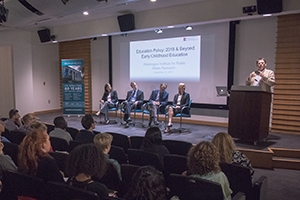On Campus
Education Policy: 2016 & Beyond

Tom Dee, far right, presents at "Education Policy: 2016 & Beyond." On stage from left to right: Stephanie Cellini, Matthew Chingos, Dave Marcotte, and Taryn Morrissey.
“Education Policy: 2016 and Beyond” was the theme of a recent panel discussion that brought together four experts to discuss ongoing changes in policy affecting education from preschool to college. The event was sponsored by School of Public Affairs and its Washington Institute of Public Affairs Research, under the direction of Dave Marcotte.
“Across the board, federal and state laws and policies that shape education are being rewritten as we speak,” Marcotte told students and faculty. “It’s not an exaggeration to say that the transformation that law, policy, and history have in store for education is unprecedented in recent history.”
Panel participants pointed out that lawmakers are taking up controversial issues previously tabled. The debate over universal pre-kindergarten education is underway, as are reauthorization of the Elementary and Secondary Education Act (The No Child Left Behind Act of 2001), and rewriting of the Higher Education Act.
Taryn Morrissey, SPA assistant professor, highlighted the importance of early childhood education in development. “The gap in achievement begins really early,” she said. “This gap is wide at kindergarten entry, it persists at K-12 and beyond, and it’s really expensive and difficult to narrow.”
Tom Dee, professor of education at Stanford University, argued for more balanced, less critical assessments of American public-school education. “We have seen evidence that schools can be transformational in the lives of at-risk kids,” Dee said.
Matthew Chingos, senior fellow at the Urban Institute, offered insight into the education policy debate, especially as it touches on higher education. “Between now and the election next November, you will hear more about higher- education policy than you have heard in any recent presidential campaign, or perhaps ever,” he said.
Chingos noted three recent developments: the release of data on federal student borrowers to the IRS; President Obama’s new College Scorecard, a massive compilation of data on college graduates; and a recent amendment to eligibility criteria for federal student aid, which allows students to fill out their forms earlier and faster.
Stephanie Cellini, associate professor of public policy at George Washington University, pointed out that for-profit colleges, such as the University of Phoenix and DeVry University, are increasingly the focus of lawmakers concerned about educational outcomes. “We are scrutinizing this industry like never before,” she said.
The September 14 panel discussion was WIPAR’s first event under the direction of Marcotte, who also serves as a professor in SPA. He has conducted extensive research in education, focusing on such topics as the factors that influence achievement in primary and secondary education and the effect of post-secondary education on employment and earnings.
The full event can be viewed here. Photos from the event are available here.

